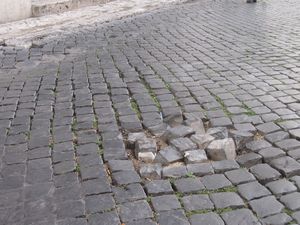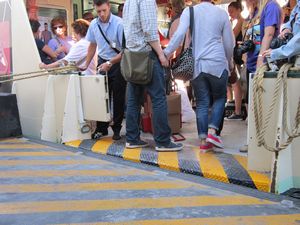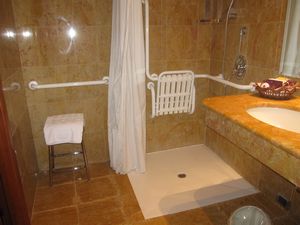12 Wheelchair Travel Tips for Italy
By John Sage
 Accessible travel in Italy can be difficult but it doesn’t have to be. While Italy presents numerous accessibility challenges, there is almost always something you can do to make it work.
Accessible travel in Italy can be difficult but it doesn’t have to be. While Italy presents numerous accessibility challenges, there is almost always something you can do to make it work.
Before your trip, educate yourself about the accessibility challenges you will encounter, and you’ll have a much easier trip with your focus on enjoying yourself rather than trying to navigate barriers. These 12 Italy Accessible Travel Tips are the first step to make your trip easier and more enjoyable.
View accessible travel packages in Florence, Naples, Rome, and Venice
1. Don’t pay full-price – Many Italian museum and churches have discounts for visitors with disabilities. In Europe, the extent of someone’s disability is indicated on an ID card. Visitors from other parts of the world will usually not be required to show documentation about their disability if they are using a wheelchair or mobility scooter. Companions sometimes also get in free – if not, look into combo tickets like the Roman Forum–Colosseum combo ticket in Rome and the Correr Museum–Doge’s Palace combo ticket in Venice.
 2. Your Rome hotel neighborhood should depend on your disability – Rome has severe cobblestones in the city centre near the Pantheon, Campo de Fiori, Trevi Fountain, and Spanish Steps (cobblestones shown in the image on the right). Manual wheelchair users may want to stay outside of this area where there are fewer cobblestones.
2. Your Rome hotel neighborhood should depend on your disability – Rome has severe cobblestones in the city centre near the Pantheon, Campo de Fiori, Trevi Fountain, and Spanish Steps (cobblestones shown in the image on the right). Manual wheelchair users may want to stay outside of this area where there are fewer cobblestones.
Power wheelchair users and mobility scooter users have a different challenge. Few public transportation options exist and accessible private transportation is expensive. Tourists using a power wheelchair or mobility scooter should stay in the very center of Rome so they can roll to the Vatican, the Trevi Fountain, and the Colosseum.
3. Take guided tours at tourist attractions – Art museums, history museums, and churches generally have much more to them than meets the eye. For each of the tourist attractions you visit, consider taking a guided tour to make the most of your visit. In some places, like the Vatican, the group tour provided by the venue is not wheelchair accessible and you’ll need to take an accessible tour provided by an outside company.
View accessible tours in the Amalfi Coast, Capri, Civitavecchia,
Florence, Livorno, Lucca, Naples, Pisa, Pompeii, Rome, Siena,
San Gimignano, Sorrento, Tuscany, the Vatican, and Venice
 4. Visit places you maybe haven’t heard of – Some of your favorite memories are likely to come from visits to places you’ve never heard of. Build in more time than you think you’ll need in each city. The Borghese Gallery in Rome, the Pitti Palace (shown in the image on the right) and the Santa Croce church in Florence, and the Frari Chruch in Venice are just a few of the lesser-known, outstanding attractions in Italy.
4. Visit places you maybe haven’t heard of – Some of your favorite memories are likely to come from visits to places you’ve never heard of. Build in more time than you think you’ll need in each city. The Borghese Gallery in Rome, the Pitti Palace (shown in the image on the right) and the Santa Croce church in Florence, and the Frari Chruch in Venice are just a few of the lesser-known, outstanding attractions in Italy.
5. Get out of the big towns – The big towns (Rome, Venice, Naples, etc…) have some great attractions, but they’re also crowded with tourists. To get a more authentic flavor of Italy, visit some of the smaller more charming towns like Siena, Verona, and Assisi.
View 11 Florence Italy Wheelchair Travel Tips
View 10 Rome Italy Wheelchair Travel Tips
View 11 Venice Italy Accessible Travel Tips
6. Fly in and out of different cities – Rather than make a big circle during your trip, consider flying into one city and out of another (even if it’s a little more expensive). If Venice is on your itinerary, consider making it your last stop. If you start in Venice, you may feel compelled to visit all of the museums and churches. If you end in Venice, you’ll be more likely to spend your time on the beautiful canals and intimate alleys.
7. Bring a city accessibility map with you – At a minimum, you’ll have a much easier time visiting Italy with a disability if you know where the hills are located in cities like Rome, Florence, Siena, and Assisi if you know where the bridges are in Rome. If you do the research before your trip, you’ll be able to spend far more time enjoying the accessible Italy experiences. On very steep streets (like the Assisi street in the video below), manual wheelchair users may need to control their descent in a wheelie.
 8. Use the vaparetto in Venice – The vaparetto water buses in Venice (shown in the photo on the right) are the easiest way for disabled travelers in Venice Italy to avoid the bridges. If you use an electric wheelchair or a mobility scooter, the occasional large height difference between the boat and the dock may mean that you need to use a wheelchair accessible water taxi.
8. Use the vaparetto in Venice – The vaparetto water buses in Venice (shown in the photo on the right) are the easiest way for disabled travelers in Venice Italy to avoid the bridges. If you use an electric wheelchair or a mobility scooter, the occasional large height difference between the boat and the dock may mean that you need to use a wheelchair accessible water taxi.
9. Avoid siesta time especially at churches – Siestas in Italy are very common for long lunches in the middle of the day. Smaller churches in particular will typically close down for a couple of hours at some point between noon and 3 pm.
10. Find out about accessible side entrances at churches – Many churches have several steps at the main entrance and no sign that indicates if there is an accessible entrance. Unless you can find a priest, there may not be anyone to ask where disabled visitors should enter. Try to find out the location of all accessible entrances before you leave on your trip.
 11. Shop around for accessible hotels– If you just take the first accessible hotel that you can come across, you likely won’t be getting the best value for your money. Many of the hotels with the best accessibility features (like the roll-in shower shown on the right) and best hotel amenities are not easy to find.
11. Shop around for accessible hotels– If you just take the first accessible hotel that you can come across, you likely won’t be getting the best value for your money. Many of the hotels with the best accessibility features (like the roll-in shower shown on the right) and best hotel amenities are not easy to find.
Spend some time to choose hotels located in the most accessible neighborhoods with numerous accessible restaurants options nearby.
View examples of accessible hotels
in Florence, Rome, and Venice
12. Make reservations at museums – Some of the best tourist sites in Italy are located in small building that get overwhelmed by tourists. At places like the Uffizi Gallery and Accademia in Florence, purchasing a ticket in advance will allow you to skip to the front of the line. At other places like Milan’s Il Cenacolo (the Last Supper) and Rome’s Borghese Gallery, you can’t get in without purchasing a ticket a few days in advance.
Contact us for an easy and memorable accessible vacation


